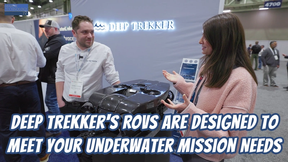Career Opportunities for Seekers of Marine Technology Jobs
The industry of marine geothermal energy increases its offer of marine technology jobs in an accelerated pace, under the pressure of international structures militating for the reduction of pollution and minimizing the impact of human societies on ocean ecosystems. This career path divides into three main areas - geothermal electricity production, geothermal direct use and geothermal heat pumps. The highest number of jobs in the geothermal marine technology is available in the US, in the field of geothermal energy production. However, as states recognize the beneficial effects of green marine energy, other countries, such as Japan, increase their focus on creating jobs in this area.
Other green marine technology jobs focus on the development, research and improvement of the underwater turbines. These underwater structures are designed to convert a part of the tidal current in non-polluting electricity via turbines. Research focuses mainly on designing efficient rotating centrifugal separator baffles to prevent harm to marine life. Jobs in researching the impact, functionality and design of tidal turbines are mostly available in the UK, due to the extensive research of these mechanisms at the Oxford University, who have already developed and applied the second generation of underwater turbines.
The oceanic geothermal industry also generates marine technology jobs, with responsibilities and tasks related to assessing and accessing geothermal reservoirs, best fit for hydraulic engineers, drillers, marine geophysicists, hydrologists and marine geochemists; mechanical engineers, technicians, workers, machinists, welders and electrical engineers responsible with the construction of power plants; engineers, geologists and various contractors for producing and installing heat pumps; highly qualified researchers and scientists specialized in mechanic and electronic engineering, geology, chemistry and materials, who are responsible for the development and research sector.
Marine tidal energy sector offers annually thousands of jobs in the field, related to building and maintaining marine power generating systems – control and instrumentation engineers, structural and geotechnical engineers and workers; discovering and analyzing the optimum locations for marine power technology – oceanographers, ecologists, hydraulic modelers; electric systems designers and managers, and software engineers responsible with energy management; divers and underwater workers.
Many marine technology jobs focus on capturing the wave power in oceanic wave power plants, scattered along the coastlines of the US, Scotland, Portugal, China, India, Japan, Australia and Norway. The energy generated by the power of water is non-polluting and renewable, and the researchers approximate that the amount of energy that could be produced using wave power energy technology can total more than double the amount the world produces at this moment. The marine technology jobs in the wave energy domain are concentrated in the area of improving and developing reliable, strong and robust water turbines, and also in test facilities.
Marine solar energy has great potential due to the photovoltaic panels that store energy in batteries for private use or the huge solar power stations on both land and sea. Solar radiation that strikes Earth's surface each year is 10,000 times greater than current world energy consumption. Researchers at energy companies develop new technologies constantly in order to exploit this potential. Consequently, there is an increasing offer in marine technology jobs that relate to the solar energy industry, in particular to the marine solar panels business. Most marine solar energy jobs are located primarily in the US and United Kingdom, due to the technological advances and research in these countries.
The number of marine technology jobs covering water transportation is constantly increasing. They vary greatly, from positions of port engineers, responsible with the overall technical management of the vessels within an assigned fleet, including planning, direction and coordination of technical maintenance procedures according to a set of standards; licensed and unlicensed deck and engine officers and personnel.
Marine electronics technicians can find jobs in almost any field of marine technology and they can find reasonably paid jobs with only a minimum of two-year degree in marine technology studies. Their job involves the maintenance of electronic systems and equipments used on ships, from evaluating, testing, installing, inspecting and repairing electronic equipment, to identifying problems and ordering new equipments.
Marine technology jobs emphasize the need for certain individual attributes without which working off-shore is impossible. Apart from technological knowledge, the applicant must have basic first aid training, ability to swim, high resistance to uncomfortable weather conditions that might affect off-shore work, as work at sea depends mainly on the weather conditions. Moreover, team play is required more than in any other career path, as most of the employer’s activity is confined in the perimeter of the ship. Regular off-shore work might make it hard for many employees to keep in touch with their families, so before going for this career path the applicant must weight his priorities well.
The payment, other benefits and possibilities of advancement are not always directly related to education or experience in the field, but also on the company the candidate plans to work for, the company’s geographic location, or the number of job candidates. Most of the times, as the employee continues his or her education, an increase in payment and benefits is to be expected. Keeping in constant touch with the latest technological advancements, striving to learn more in a competitive field, constantly certifying your knowledge through additional classes or individual study can also contribute to a higher remuneration. Like in most fields, sticking to one’s path and anticipating the future trends and necessities in the industry can keep you one step ahead of all other candidates. Excellence in rewarded in any work field, and marine technology makes no exception.














 December 2025
December 2025



